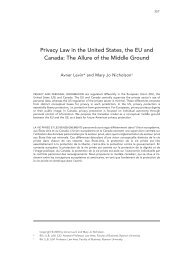Commentary on Fichte's “The Illegality of the Unauthorised ... - uoltj
Commentary on Fichte's “The Illegality of the Unauthorised ... - uoltj
Commentary on Fichte's “The Illegality of the Unauthorised ... - uoltj
You also want an ePaper? Increase the reach of your titles
YUMPU automatically turns print PDFs into web optimized ePapers that Google loves.
148 university <strong>of</strong> ottawa law & technology journal www.<strong>uoltj</strong>.ca<br />
Shortly after Fichte took up his first university teaching post in Jena in<br />
1794, 30 his attempts to address <strong>the</strong> criticisms <strong>of</strong> Kantian critical philosophy 31<br />
led him to become a rising star in <strong>the</strong> German intellectual world, although this<br />
fame was short-lived. 32 In his attempts to extricate Kantian philosophy from<br />
its difficulties, Fichte argued that <strong>the</strong> subject is not passive, but ra<strong>the</strong>r actively<br />
engaged in affecting <strong>the</strong> objective world. It is through this “striving toward <strong>the</strong><br />
world” that <strong>the</strong> resistance <strong>of</strong> external objects is experienced, and this resistance<br />
c<strong>on</strong>stitutes <strong>the</strong> objectivity <strong>of</strong> external things. 33 Through this active mastery <strong>of</strong><br />
objects external to <strong>the</strong> self, <strong>the</strong>y begin to c<strong>on</strong>form to humans’ rati<strong>on</strong>al ideas <strong>of</strong><br />
<strong>the</strong>m. And yet, a purely rati<strong>on</strong>al idea is impossible. As a result, Kant’s view that<br />
humans are merely passively acted up<strong>on</strong> by objects is false—humans also act <strong>on</strong><br />
<strong>the</strong> world—and yet, as Kant maintained, humans cannot entirely make <strong>the</strong> world<br />
c<strong>on</strong>form to <strong>the</strong>ir ideas <strong>of</strong> it. 34<br />
Fichte’s attempt to overcome <strong>the</strong> difficulties with Kant’s philosophy was<br />
both an inspirati<strong>on</strong> 35 and a target for later German idealists such as Hegel. 36<br />
Indeed, after <strong>the</strong> A<strong>the</strong>ism C<strong>on</strong>troversy, 37 criticism <strong>of</strong> Fichte mounted <strong>on</strong> all<br />
sides. For example, Hegel’s publicati<strong>on</strong> <strong>of</strong> The Difference Between Fichte’s<br />
and Schelling’s System <strong>of</strong> Philosophy in 1801 provided a trenchant critique <strong>of</strong><br />
Fichte’s philosophy and dem<strong>on</strong>strated <strong>the</strong> superiority <strong>of</strong> Schelling’s views over<br />
those <strong>of</strong> Fichte. Am<strong>on</strong>g o<strong>the</strong>r criticisms, Hegel argued that Fichte’s attempt<br />
to ground objectivity in <strong>the</strong> striving ego failed to overcome <strong>the</strong> dualism that<br />
plagued Kant’s philosophy. According to Hegel, <strong>the</strong> ego that strives and <strong>the</strong><br />
object that limits <strong>the</strong> ego are never satisfactorily united. 38 Fichte, unable to<br />
adequately meet <strong>the</strong> objecti<strong>on</strong>s <strong>of</strong> Hegel and his c<strong>on</strong>temporaries, never quite<br />
regained <strong>the</strong> philosophical stature that he enjoyed in <strong>the</strong> mid- to late-1790s.<br />
Never<strong>the</strong>less, Fichte’s early works, <strong>of</strong> which <strong>the</strong> present essay <strong>on</strong> <strong>the</strong> <strong>“The</strong> Pro<strong>of</strong><br />
<strong>of</strong> <strong>the</strong> <strong>Illegality</strong> <strong>of</strong> <strong>the</strong> <strong>Unauthorised</strong> Reprinting <strong>of</strong> Books” is an example, are an<br />
important c<strong>on</strong>tributi<strong>on</strong> to, and elaborati<strong>on</strong> <strong>of</strong>, German idealism generally, and<br />
more specifically, an elaborati<strong>on</strong> <strong>of</strong> a rights-based approach to law. Indeed, when<br />
compared to Kant’s early comments <strong>on</strong> <strong>the</strong> subject <strong>of</strong> reprinting, Fichte’s essay<br />
is a much more systematic explanati<strong>on</strong> <strong>of</strong> <strong>the</strong> origin and nature <strong>of</strong> copyright than<br />
that provided by Kant. 39 However, before exploring Fichte’s <strong>the</strong>ory <strong>of</strong> intellectual<br />
property in greater depth, it is helpful to turn now to a brief overview <strong>of</strong> <strong>the</strong>ories<br />
<strong>of</strong> intellectual property <strong>of</strong> Fichte’s c<strong>on</strong>temporaries.<br />
30. Rohs, Johann Gottlieb Fichte, supra note 28 at p. 13.<br />
31. Rohs discusses how Fichte’s philosophy was in part inspired by <strong>the</strong> desire to overcome Kantian dualism.<br />
Johann Gottlieb Fichte, supra note 28 at p. 146.<br />
32. Following <strong>the</strong> “A<strong>the</strong>ism C<strong>on</strong>troversy” <strong>of</strong> 1798–1799, Fichte was so<strong>on</strong> supplanted by FW Schelling as <strong>the</strong><br />
pre-eminent German philosopher (Rohs, Johann Gottlieb Fichte, supra note 28 at p.145). On <strong>the</strong> A<strong>the</strong>ism<br />
C<strong>on</strong>troversy, see George di Govanni, “From Jacobi’s Philosophical Novel to Fichte’s Idealism: Some<br />
Comments <strong>on</strong> <strong>the</strong> 1798-99 ‘A<strong>the</strong>ism Dispute,’” (1989) 27:1 Journal <strong>of</strong> <strong>the</strong> History <strong>of</strong> Philosophy 75–100; and<br />
Rohs, Johann Gottlieb Fichte, supra note 28 at p. 111–120.<br />
33. Rohs, Johann Gottlieb Fichte, supra note 28 at p. 60.<br />
34. Beiser, <strong>“The</strong> Enlightenment and Idealism,” supra note 28 at p. 30.<br />
35. Baumanns, JG Fichte, supra note 27 at p. 20.<br />
36. Baumanns, JG Fichte, supra note 27 at p. 60–61.<br />
37. For a good account <strong>of</strong> <strong>the</strong> c<strong>on</strong>troversy, see Rohs, Johann Gottlieb Fichte, supra note 28 at p. 111–120.<br />
38. HS Harris, “Introducti<strong>on</strong> to <strong>the</strong> Difference Essay,” in G.W.F. Hegel, The Difference Between Fichte’s and<br />
Schelling’s System <strong>of</strong> Philosophy (State University <strong>of</strong> New York Press, 1977) 1-78 at p. 36. See also Hegel’s<br />
expositi<strong>on</strong> <strong>of</strong> this problem. Hegel, The Difference Between Fichte’s and Schelling’s System, ibid at 119–126.<br />
39. Geller, “Copyright between Marketplace and Authorship Norms,” supra note 20 at p. 169.









